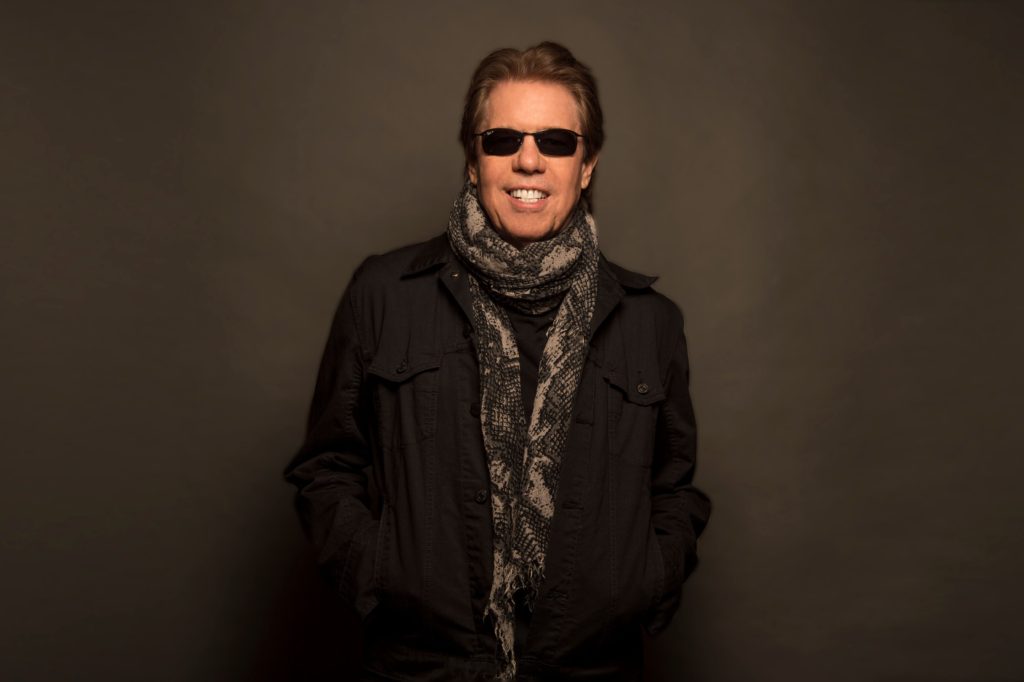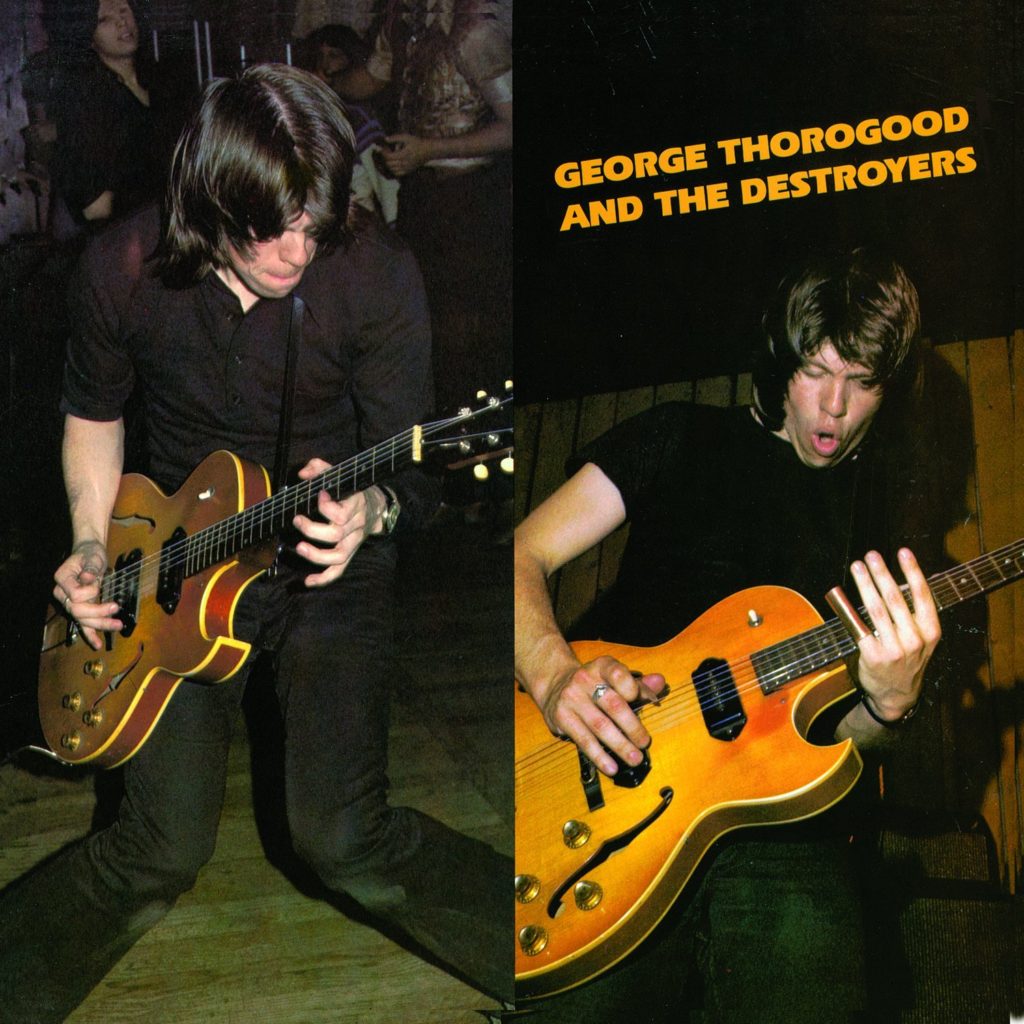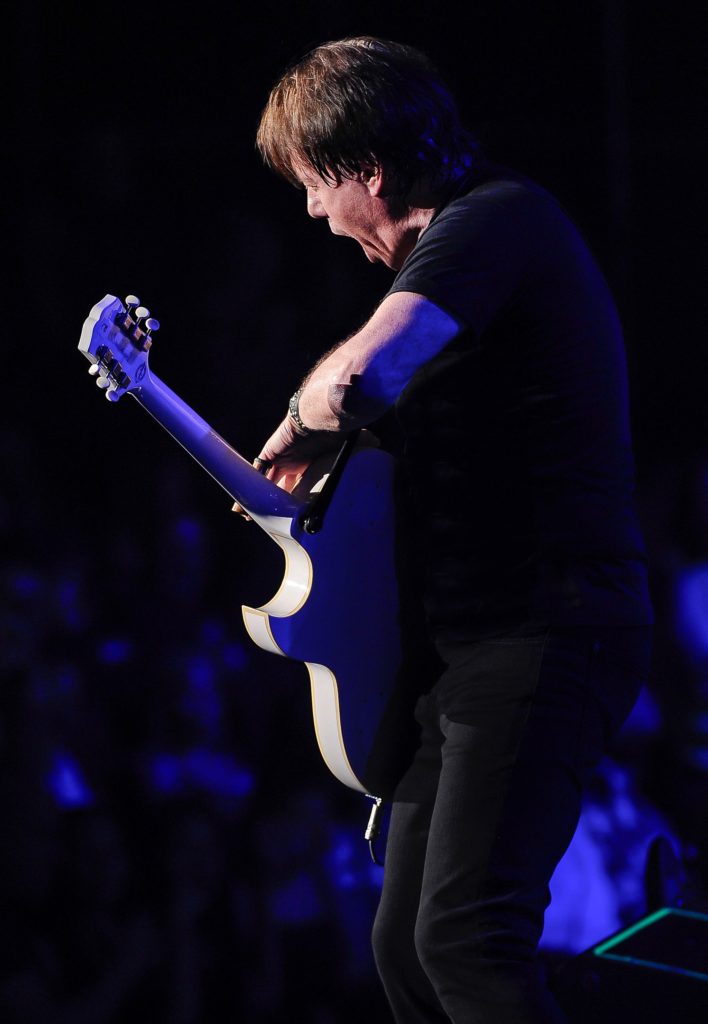By: Cody Sikes

George Thorogood – Photo Credit: David Dobson
George Thorogood has been on a rock ‘n’ roll mission with The Destroyers to rip it up with nasty riffs, growls and a thumping backbeat of sound. The heart of rock beats hard with the gents that pull out the stops with him, Jeff Simon (drums and percussion), Bill Blough (bass.guitar), Jim Suhler (rhythm guitar) and Buddy Leach (saxophone).
For over 45 years, George Thorogood and The Destroyers have travelled the globe playing gig after gig, until like all of us they were hit by COVID 19 that stopped them in their tracks. In 2019, they were on their Good to Be Bad Tour: 45 Years of Rock tour still packing venues and a dream of life in rock ‘n’ roll was a reality.
George started out as a solo performer, but soon formed a power trio he named The Destroyers, and they played gigs in their native town of Wilmington, Delaware. He tells of the time when he realized success shouldn’t be measured in the size of his audiences, but the impact the music had on them. Success was to be measured in energy level, not crowd size.
Still, the group would build a following and nail down sell-out crowds wherever they perform.
In 2018, George was formally recognized and honored when he won the B.B. King Award from the International Jazz Festival. His release of the his album, Party of One, sold faster than any of his previous albums, a success few in the music industry ever see in what’s now a nearly saturated arena of rock ‘n’ rollers.
And it’s no wonder with such hit songs as, “Get a Haircut”, “I Drink Alone”, “One Bourbon, One Scotch, One Beer”, “Move It On Over”, “Who Do You Love” and his iconic monster hit, “Bad to the Bone”.
“We hear our walk-on song, the lights go down, and something inherently clicks the second we step on stage. We feel the audience’s energy and the show just explodes.” – Bill Blough
But, life in the spotlight, isn’t the entire reality a performer lives. In August 2019, George announced a partnership with the T.J. Martell Foundation to launch the Maria Thorogood Memorial Fund for Ovarian Cancer Research, in honor of his wife who passed away in 2019.
George and I started out where many conversations begin these days, with the COVID-19 pandemic and how we’re all realigning our lives to mitigate the risk of not only every day life, but our pursuits to move forward with our careers, education and other livelihoods.
******
 Cody Sikes: Has it been difficult for you to transition to more electronic engagement rather than in person given the pandemic conditions?
Cody Sikes: Has it been difficult for you to transition to more electronic engagement rather than in person given the pandemic conditions?
George Thorogood: It’s not really difficult for me, we have technicians who take care of that sort of thing. A little while ago, my guitars were shot and they had to get me some new instruments, and I had to adapt to that. But, they were designed for the same instruments that I had.
As far as the new technology stuff goes, most of it I’m not even aware of. I’ll just go to the sound people or people who come to the show and say “Man, it sounded better than ever,” or “It looked better than ever,” and our tech people will say “Oh, that’s because we have this now, this new invention we’ve been using.” It’s not difficult if it means improvement, and why invent something if it doesn’t mean improvement? That’s the whole point, isn’t it?
Cody: It’s nice that you’ve got a great crew behind you to help you constantly improve your sound.
George Thorogood: It’s nice, that’s a bonus, to make friends and influence people. Well, I’m really not in the business to make friends, but I am in the business to influence people. If the crew is nice, that’s a bonus and we’re fortunate with that.
Cody Sikes: Have you found that there are any benefits to being in social isolation? Like giving more opportunity to write, practice, or reach out to your audience?
George Thorogood: Well the pressure’s there all the time, since that’s what being a professional’s all about. And speaking of that and saying the pressure’s ever on, a ball player named Willie Stargell, after the Pirates won the World Series and he was the MVP, and he had a terrific series, the writer said, “Willie, you really did great under pressure,” he said “Wait a minute. Playing baseball is exciting. My mother raised 8 children alone and had to put food on the table everyday. That’s pressure.”
I don’t really look at it as pressure, I get excited. The more excited the fans get, the more I’m going to try to deliver and give them what they’ve been digging all along. People who have to deal with brain surgery and things like that, they’re under pressure. We’re fortunate to be in a business that is very exciting, if that answers your question.
Cody: It’s not hard to see that you have an intense passion for life. What do you do to maintain that attitude?
George Thorogood: That attitude never goes away from the day it gets into you. It’s there from day one or you don’t pick up the guitar or step on stage. And with me, it’s not that I have to maintain it, almost like can we get George to contain himself?
Steven Tyler said, “There’s no rehab for adrenaline,” so it’s not something you maintain, it’s just always there. It just gets at a higher level when we go out and perform. That’s why you’re doing the interview, right? [Laughs]
George Thorogood: I would say, like in anything, especially in the entertainment business, I try to keep my options open. I probably said that in the two days after I finished the album, and it was not an easy thing to do because I’m not a solo artist, I was playing songs I haven’t played in 35-40 years, and I was playing alone. I’m used to playing with a band in a studio.
So, I probably said that out of exhaustion. It’s like a lady gives birth to her second or third child and then two days after that says “No more!”, but maybe two or three years down the road, that attitude could change. Attic [Records] could come along and say “We want another record of that style, do you have it in you?” And I’d check it out, maybe give it a shot. So that option’s always open.
Cody: Most artists have a lot of projects and ideas that they would like to do, but oftentimes don’t have the opportunity to do so. Do you have any dream projects that you’d like to pursue? Even something unrelated to music?

George Thorogood – Photo credit: Steve Jennings.
George Thorogood: Yeah, I want to be in a movie with Robert De Niro before it’s all over. He can blow me away in the first scene. Great. He can take the rest of the movie. How’s that?
Cody Sikes: [Laughs] That’s great. Why Robert De Niro?
George Thorogood: I’m a big fan of his and his movies. As far as the music goes, I’m still waiting for McCartney or Dylan to call me to play on the record, but I don’t think that’s going to happen. But hey, you never know. You can’t give up hope, know what I mean?
Cody: Right, keep your options open. Do you have any upcoming plans with the Destroyers?
George Thorogood: Yes. If all goes well, we’ll be picking it up again in late April next year and continue the shows from this year that had to get postponed. So yeah, we have plans. We’ve got a Canadian thing coming up, then a European thing in the summer, and from then on.
But, we’re just getting the green light that, when the restrictions are off and hopefully when the virus has been taken care of, we will be ready. There have been plans all along, rock and roll never sleeps, man. Money never sleeps, as they say.
So, even when this happened, all the promoters, agents, managers, club owners, they still have to go to work to keep the thing going. They don’t just say, “Well I’ll take a whole year off,” that doesn’t work in the industry.
You have to keep going and be able to adjust to any kind of new twist that comes along, be it good or bad. So as far as I know, we’re going to work next year.
Cody: That’s really exciting, I’m looking forward to seeing you guys get back into it. You have a really impressive record with touring, both in quality and quantity. Before the virus hit, you were showing no signs of slowing down. Have you found that you’re more comfortable on the road, as opposed to being a homebody?
George Thorogood: When I’m not on the road playing rock and roll shows, I stick close to home because there’s really nothing out there that interests me. You know, my family’s here, my guitar’s here, my exercise equipment is here, I can always get people to deliver food. [Laughs]
So, this epidemic has not really altered my lifestyle very much. I’m still doing what I always did: stay put until Adam Conde, your manager, calls for you. It’s kind of like a fireman, or someone in the military. You’re in the barracks until you’re assigned to do something else.
Cody: When you are touring, does constantly being on the road tire you out?
George Thorogood: First of all, we’re not constantly on the road. If we were constantly on the road, I’d be dead by now. You can’t do anything constantly. Our schedule has been pretty reasonable and well thought out over the years, and yeah, I get tired.
Some days I wake up thinking I’m too tired to do the show tonight, due to a long drive or I may have a migraine headache, but in general, the whole thing I do not get tired of because we just keep making it better and better.
The roads are better, the buses are better. The buses are fantastic, they’re like a hotel on wheels. The hotels we stay in always welcome us and other rock bands to come there, so sometimes I get tired, but I never get tired of it.
George Thorogood: You know, one thing that was the genius of the artists of the past was the incredible sounds created in the studio. People like Bo Diddley, the Beatles, Jimi Hendrix, and Jeff Beck, they all created their sounds due to the limited amount of technology they had. That takes pure genius to make something like that happen.
Nowadays, they have everything, like “I’ve got an amplifier the size of a lunchbox, George, and you can get any sound in the world you want.” Now that is fantastic because you can hook it up to PA (Public Address System), and today a PA costs 19 million dollars to make.
The PA that you played in 40 years ago cost $18 to make, so the advances that they’ve made in technology are very encouraging. The equipment is just better, and they keep making it better, which makes the performer play better, and then you want to continue.
Cody: I’m sure the constantly changing technology does keep the business interesting, especially in recording.
George Thorogood: The concerts I’ve gone to, which are fantastic, I’ve seen McCartney five times, I’ve seen the Rolling Stones a couple of times recently, and when McCartney does his show, his songs, Wings material of course, and Beatles classics, he sounds exactly like the record. The Beatles couldn’t do that back in ‘65 and ‘66.
Technology had to catch up to the Beatles genius. So, once it did and Paul was having the time of his life playing his music, he can hear it sounds great. It reaches 75,000 people. When he played in Shea Stadium to 55,000 people, nobody could hear a thing. That was really a shame, so the better the technology, the more encouraged you’re going to be to do it. Or so it appears to me.
Cody: You’ve recently established the Marla Thorogood Memorial Cancer Research Fund. It’s a wonderful, constructive tribute to a great cause. Would you mind telling me about how you decided it was the right way to honor your wife and why it gives you special purpose?

George Thorogood – Photo credit: Steve Jennings
George Thorogood: It was actually my daughter’s brainstorm to start the foundation. I chipped in with the name ROC, Research on Ovarian Cancer. She has to take credit for getting the ball rolling on that. But, if you say you admire it, actions speak louder than words, put your money where your mouth is and buy a t-shirt, because the money goes to the foundation. That’s as much as I can elaborate on it.
Cody: So, it was your daughter’s vision to make this happen?
George Thorogood: Yeah, she started it, really, it was her thing. I spoke to my wife at the time when I came up with that name, ROC, and she liked it, so I said we’ll get that rolling. Unfortunately, tragically, you know what happened, and my daughter stepped in and said we’re going to start a foundation.
See, this whole thing is a war against diseases. I am merely a buck private in the war, I’m not the general that plans these things. I’m just on board, you just tell me what to do. Point me towards the band stand and I’m there. I’m just another buck private in the war against these diseases.
Cody: Does Rio continue to operate as a central figure in the management of the fund?
George Thorogood: She works with our manager, Adam Conde, and they take care of the details. I’m not real good on texting and that sort of thing, so they set up the battle plan and I’ll jump in when services are required.
Cody: That being said, did you have any hand in deciding which research center the proceeds would be sent to?
George Thorogood: Well, yeah, we did this before and we’re still active with the LLS Leukemia Society. I got involved with that and another thing came up and I said, “Okay.”
I’m ready to volunteer any time for the service, but I’m not real good at creating the foundation for these services. I’m not good at creating wars, I’m just good at fighting them, you know?